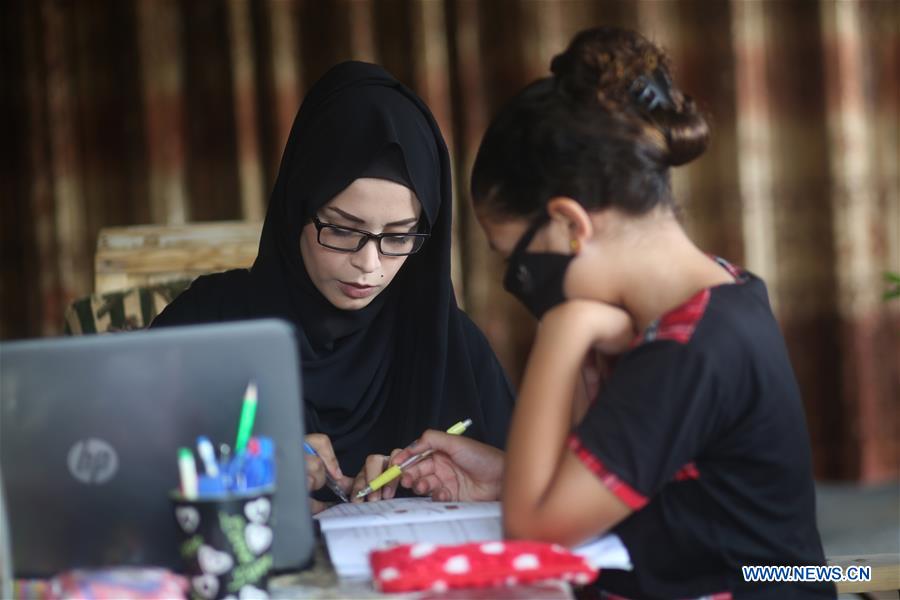
A Palestinian woman teaches her child inside their house in the northern Gaza Strip town of Beit Lahia, on Sept. 1, 2020. (Photo by Rizek Abdeljawad/Xinhua)
by Sanaa Kamal
GAZA, Sept. 1 (Xinhua) -- Ekhlass Mohammed from the northern Gaza town of Beit Lahia decided to teach her four siblings at home when schools in the Gaza Strip have been shut down once again after a few weeks of reopening amid resurgence of COVID-19.
In addition to the ordinary curriculum, she also decided to teach them English, Arabic and maths using a computer.
The 22-year-old young woman told Xinhua that the new closure has "brought us back to zero point of the educational process."
"All of us must hold our responsibility towards our people and students, who would lose their school year if we did not take care of them," she explained.
When the new cases have been exposed, the Hamas-run government imposed a full lockdown on whole Gaza in order to combat the virus.
All schools, mosques, local markets and institutions were closed, while public gatherings have been prohibited in Gaza.
However, Hala Abu Ryash, a mother of four children from northern Gaza, said that poverty prevents her from buying mobile phones or laptops for her children.
She added that staying at home for a long period of time impacted badly on her and her children's psychology, saying that "nothing can replace traditional education."
So far, the Gaza Health Ministry has recorded 400 COVID-19 cases, including 290 cases from the internal community and four fatalities since the outbreak of the virus on March 5.
In light of the spread of the virus, the resumption of the educational process and the return to schools is linked to "the recommendations of the specialized committees," said Ziad Thabet, undersecretary of the Ministry of Education in the Gaza Strip.
In a press statement sent to Xinhua, Thabet said that distance education has its various tools and methods, such as self-learning cards, specific assignments and scientific projects, in addition to radio or electronic lessons.
To simplify the process, Nihaya al-Ramlawy, a teacher at a governmental school, had gathered all of her students in a Facebook group to teach them how they can use the electronic education to get their lessons.
The 36-year-old teacher told Xinhua that her decision was aimed at teaching children and continuing the teaching process without interruption.
But she added that not all students adhere to this mechanism, indicating that the lack of regular electricity is a direct reason for this.
More than half a million students attend schools in Gaza and more than half of them attend schools affiliated with the United Nations Relief and Works Agency for Palestine Refugees in Near East (UNRWA).
Farid Abu Azra, head of UNRWA Education Program in Gaza, told Xinhua that they are working to promote a culture of distance learning among students at all levels, and a large team has been formed to work in this field in order to facilitate e-learning.
"We know very well that there are many difficulties that families face, including power cuts and the lack of mobile phones or tablets," Azra said. Enditem



